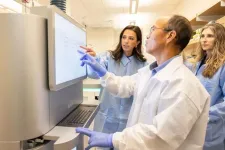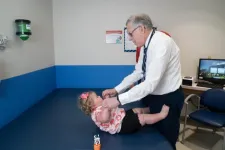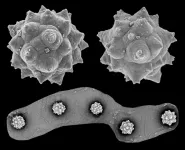(Press-News.org) Five years on since The BMJ’s special issue on racism in medicine, and a global pandemic, the landscape is very different, but has racism in the NHS and UK medicine got better or worse?
In 2020, a BMJ investigation found that UK medical schools were failing to deal with complaints of racism. Another round of requests to the UK’s 46 medical schools has now found that eight in 10 (34 of 41 that responded) are collecting data on complaints about racism, up from half in 2020. And the number of complaints logged has risen to at least 138 in five years, compared with just 11 between 2010-20.
Some 83% of medical schools also said they had adopted the British Medical Association (BMA) charter and guidance for students to prevent and effectively deal with racial harassment.
It’s hard to say whether this rise is significant as there’s no comparable data about racial incidents reported among ethnic minority undergraduates generally, writes Gareth Iacobucci, Assistant News Editor at The BMJ. But the number of 138 seems small, especially as almost half (49%) of the UK’s 50,000 or so medical undergraduate students are from ethnic minority backgrounds.
Even still, it is a sign of progress, said Olamide Oguntimehin, a resident doctor working in Kent. “While the increase in complaints may seem concerning at first glance, it could also indicate that people feel more confident to report it because they trust or hope that there'll be action taken or support provided as a result," she said.
Ria Bansal, the BMA medical students committee co-deputy chair for student welfare, and a fourth year at University of Nottingham, also told The BMJ that since 2020, she felt racial harassment and racism had become less of a “taboo topic,” and that grassroots activism from ethnic minority students and doctors was holding medical schools more accountable.
But Lois Haruna-Cooper, associate professor at UCL Medical School, said that despite efforts to support students who wish to make complaints, underreporting is definitely still an issue, particularly on clinical placements.
The latest figures support this, showing that while most schools have published protocols for dealing with students’ complaints about racism or harassment within university grounds, these typically do not cover students working on placements in hospitals or GP practices.
Haruna-Cooper said she has mixed feelings on how much improvement there has been in tackling racism and racial harassment, and added that success won’t come from medical schools taking action in isolation.
In an accompanying debate article, Mala Rao, Director of the Ethnicity and Health Unit at Imperial College London, says there are many shoots of hope.
For example, she points to initiatives that are transforming workforce experience, opportunity and performance for specialist, associate specialist, and specialty (SAS) doctors and locally employed doctors - most of whom are international medical graduates, and a landmark move to make inclusion a key condition for National Institute for Health and Care Research (NIHR) funding for health research.
What’s more, there’s been a modest increase in ethnic minority representation in medical leaders on the NHS Board, in NHS Trusts, and at some medical royal colleges.
Changes to clinical practice that have previously undermined diagnoses and care of ethnic minority people are also evident, she writes, while the then NHS CEO Simon Stevens' empathetic leadership in announcing his support for the launch of the NHS Race and Health Observatory (RHO) in 2020 “inspired an upsurge of activism and leadership at the front line of healthcare.”
She acknowledges that true equity across ethnic groups will take many years to achieve, but says “the NHS landscape has changed beyond recognition, and action to root out racism and discrimination is stronger than ever.”
But Victor Adebowale, Chair of the NHS Confederation, argues that five years on, there has been change - but not enough.
He acknowledges the work of the RHO, but says “failures to tackle racism in medicine, healthcare, and the NHS are still too prevalent for me to say that we’re making anything like enough progress.”
He points out that the NHS and healthcare don’t exist in a vacuum and warns that recent events in the US - and indeed the mood in Europe - risk reversing the small gains made in healthcare and in society in general, with many pushing back on equity, diversity, and inclusion (EDI) programmes and a rise in general “anti-woke” sentiment.
He also highlights a persistent lack of accountability from those at the top ... “with the resulting racial inequity and inequality ranging from cancer outcomes to mental healthcare.”
While he can see small signs of improvement, he says “the needle isn't moving quickly enough, and it may start going backwards as leaders respond to the prevailing societal and political winds.”
[Ends]
END
Racism in medicine - are things getting better?
There are signs of progress, but some argue that not enough has changed
2025-02-20
ELSE PRESS RELEASES FROM THIS DATE:
Forcing UK creatives to ‘opt out’ of AI training risks stifling new talent
2025-02-20
The UK government should resist allowing AI companies to scrape all copyrighted works unless the holder has actively “opted out”, as it puts an unfair burden on up-and-coming creative talents who lack the skills and resources to meet legal requirements.
This is according to a new report from University of Cambridge experts in economics, policy and machine learning, who also argue the UK government should clearly state that only a human author can hold copyright – even when AI has been heavily involved.
A collaboration between three Cambridge initiatives – ...
Almost 90% of people would agree to genetic testing to tailor medication use, survey finds
2025-02-20
New research shows almost 90% of people in England would agree to genetic testing to get the most effective medication and reduce the risk of side effects
85% thought that the NHS should offer pharmacogenomic testing to people with multiple health conditions
58% of people thought that the NHS should offer this testing to everyone
91% wanted access to their own pharmacogenomic data, with many wanting this via the NHS app
Pharmacogenomics – an individual’s genetic response to medications – is an increasingly important strand of personalised healthcare but little is known about the public's views ...
Study: UTA research drives widespread economic impact
2025-02-19
University of Texas at Arlington research projects contributed $59 million to the national economy in 2024—an increase of 39% from 2023, according to a new report from the Institute for Research on Innovation and Science (IRIS).
UTA has invested heavily in research infrastructure, purchasing cutting-edge scientific equipment and technology, such as North Texas’ most advanced gene sequencer and a super-sensitive magnetic resonance imaging machine for the Clinical Imaging Research Center. The funds also support collaboration with other research organizations.
UTA worked through 1,144 unique ...
Promising results from first prenatal therapy for spinal muscular atrophy
2025-02-19
(MEMPHIS, Tenn. – February 19, 2025) Spinal muscular atrophy (SMA) is a progressive neurodegenerative disorder set in motion before birth. Scientists at St. Jude Children’s Research Hospital led the first in uterotreatment of SMA with the orally administered drug risdiplam. More than two years after the child was born, no identifiable features of SMA have been observed. This study demonstrates the feasibility of treating SMA prenatally and supports further investigation into the approach. The findings were published ...
Nitrogen fixation on marine particles is important in the global ocean
2025-02-19
How on Earth?
It has puzzled scientists for years whether and how bacteria, that live from dissolved organic matter in marine waters, can carry out N2 fixation. It was assumed that the high levels of oxygen combined with the low amount of dissolved organic matter in the marine water column would prevent the anaerobic and energy consuming N2 fixation.
Already in the 1980s it was suggested that aggregates, so-called “marine snow particles”, could possibly be suitable sites for N2fixation, ...
FDA approves vimseltinib for tenosynovial giant cell tumor (TGCT)
2025-02-19
The U.S. Food and Drug Administration (FDA) has approved vimseltinib (RomvimzaTM) for adult patients with a rare condition called tenosynovial giant cell tumor (TGCT). TGCT is a tumor of the tissue that lines the joints.
Sarcoma oncologist William Tap, MD, Chief of the Sarcoma Medical Oncology Service at Memorial Sloan Kettering Cancer Center (MSK), led the international phase 3 MOTION trial that resulted in the drug’s approval. Vimseltinib is a type of targeted therapy called a kinase inhibitor and is taken as a pill.
“This approval is an exciting advance for ...
Columbia Climate School launches M.S. in Climate Finance
2025-02-19
The Columbia Climate School has announced the first master’s degree program in the United States for climate finance. In close collaboration with the Columbia Business School, this interdisciplinary degree will drive impactful solutions to the climate crisis through advanced financial tools and scientific knowledge. This is the third master’s program announced by the Climate School, in addition to an M.A. in Climate and Society and an M.S. in Climate degree.
“The world needs problem-solvers to address the global climate crisis,” said Alexis Abramson, dean of the Columbia Climate School. “Everyone ...
MD Anderson receives nearly $23 million in CPRIT funding for cancer research, faculty recruitment
2025-02-19
HOUSTON ― The University of Texas MD Anderson Cancer Center today was awarded nearly $23 million from the Cancer Prevention and Research Institute of Texas (CPRIT) in support of 20 cancer research projects to advance new breakthroughs in discovery, translational, clinical and prevention science. In addition, CPRIT awarded $2 million for the recruitment of one first-time, tenure-track faculty member.
“We sincerely appreciate CPRIT’s continued funding of impactful cancer research that will help us achieve our mission to end cancer,” said ...
A new way to observe electrons in motion
2025-02-19
Electrons oscillate around the nucleus of an atom on extremely short timescales, typically completing a cycle in just a few hundred attoseconds (one attosecond is a quintillionth of a second). Because of their ultrafast motions, directly observing electron behavior in molecules has been challenging. Now researchers from UC San Diego’s Department of Chemistry and Biochemistry have suggested a new method to make visualizing electron motion a reality.
This new method describes an experimental concept called ultrafast vortex electron diffraction, which allows ...
Study reveals palm trees once thrived in subarctic Canada
2025-02-19
New London, Conn. — A new study by Connecticut College provides strong evidence that palm trees once thrived in subarctic Canada, reshaping scientific understanding of past Arctic climates.
Conn Professor Peter Siver’s research, published in the journal Annals of Botany, confirms that during the late early Eocene—approximately 48 million years ago—this region maintained warm temperatures year-round, even during months of winter darkness. The work was done in collaboration with colleagues from Canada and Poland.
Siver’s team identified fossilized phytoliths—microscopic ...
LAST 30 PRESS RELEASES:
Justice after trauma? Race, red tape keep sexual assault victims from compensation
Columbia researchers awarded ARPA-H funding to speed diagnosis of lymphatic disorders
James R. Downing, MD, to step down as president and CEO of St. Jude Children’s Research Hospital in late 2026
A remote-controlled CAR-T for safer immunotherapy
UT College of Veterinary Medicine dean elected Fellow of the American Academy of Microbiology
AERA selects 34 exemplary scholars as 2026 Fellows
Similar kinases play distinct roles in the brain
New research takes first step toward advance warnings of space weather
Scientists unlock a massive new ‘color palette’ for biomedical research by synthesizing non-natural amino acids
Brain cells drive endurance gains after exercise
Same-day hospital discharge is safe in selected patients after TAVI
Why do people living at high altitudes have better glucose control? The answer was in plain sight
Red blood cells soak up sugar at high altitude, protecting against diabetes
A new electrolyte points to stronger, safer batteries
Environment: Atmospheric pollution directly linked to rocket re-entry
Targeted radiation therapy improves quality of life outcomes for patients with multiple brain metastases
Cardiovascular events in women with prior cervical high-grade squamous intraepithelial lesion
Transplantation and employment earnings in kidney transplant recipients
Brain organoids can be trained to solve a goal-directed task
Treatment can protect extremely premature babies from lung disease
Roberto Morandotti wins prestigious Max Born Award for pioneering research in quantum photonics
Scientists map brain's blood pressure control center
Acute coronary events registry provides insights into sex-specific differences
Bar-Ilan University and NVIDIA researchers improve AI’s ability to understand spatial instructions
New single-cell transcriptomic clock reveals intrinsic and systemic T cell aging in COVID-19 and HIV
Smaller fish and changing food webs – even where species numbers stay the same
Missed opportunity to protect pregnant women and newborns: Study shows low vaccination rates among expectant mothers in Norway against COVID-19 and influenza
Emotional memory region of aged brain is sensitive to processed foods
Neighborhood factors may lead to increased COPD-related emergency department visits, hospitalizations
Food insecurity impacts employees’ productivity
[Press-News.org] Racism in medicine - are things getting better?There are signs of progress, but some argue that not enough has changed



